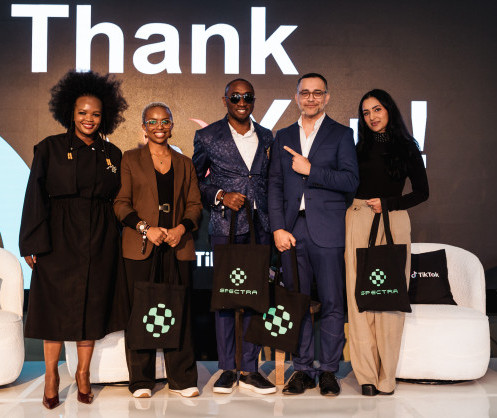TikTok announces expansion of $2.3 million global mental health fund and in-app support services across Sub-Saharan Africa at Digital Well-Being Summit in Johannesburg
TikTok (www.TikTok.com) today hosted its inaugural Digital Well-being Summit in Johannesburg, bringing together policymakers, mental health experts, NGOs, and industry leaders across Sub-Saharan Africa. Delegates from South Africa, Kenya, Nigeria, Ghana, Ethiopia, Zimbabwe, and beyond gathered to further strengthen efforts to support and protect community well-being on the platform. The summit provided a platform for open dialogue on enhancing online safety tools, promoting digital literacy and access to experts, fostering a balanced online environment.
A comprehensive suite of new tools and partnerships were introduced, including the expansion of TikTok’s global $2.3 million mental health fund to Sub-Saharan Africa, expanded local in-app helplines, and an industry-first meditation feature for all TikTok users. The event also spotlighted ongoing efforts such as TikTok’s #MentalHealthMatters campaign, which continues to promote positive mental health practices across the globe. Together, these actions are designed to support balanced digital habits, providing communities with access to reliable information.
“We commend the private sector’s efforts to foster digital literacy and create a safer online environment for all. Such efforts reflect the government and the private sector’s collective responsibility to inspire creativity, empower communities and connect young people to the digital world,” added Hon. Minister Siviwe Gwarube, Minister of Basic Education, South Africa.
Bringing in-app meditation to our entire community
As part of its commitment to empowering users to manage their online experience, TikTok has introduced a guided meditation experience in Sleep Hours – an in-app well-being experience automatically enabled at 22:00 for all users under the age of 18. Anyone above this age can choose to turn it on. This feature, the first of its kind in the industry, was piloted in March 2025 and is available worldwide.
Research shows that mindful meditation can improve sleep quality, helping young users wind down and build healthier night-time routines. The introduction of this tool reinforces TikTok’s mission to support digital well-being by fostering better sleep hygiene and emotional regulation, particularly for teens and adolescents navigating the pressures of a hyper-connected world.
“People come to TikTok to learn, share their experiences, and connect with communities around the world. That’s why we’re proud to introduce tools that not only support digital wellbeing, but also empower our community, especially young users, with a safe, supportive space to explore and navigate complex emotions,” said Valiant Richey, TikTok Global Head of Trust and Safety Outreach and Partnerships.
TikTok’s Mental Health Education Fund Expands to Support African Organsiations
At the summit, TikTok also announced the expansion of its $2.3 million global Mental Health Education Fund to include organisations from Sub-Saharan Africa for the first time, marking a significant milestone in the platform’s commitment to supporting mental health education across the continent.
” We commend the private sector’s efforts to foster digital literacy and create a safer online environment for all “
With this expansion, three Sub-Saharan African organisations have been selected as inaugural regional recipients, including the South African Depression and Anxiety Group (SADAG), Mentally Aware Nigeria Initiative, and Kenya’s Mental360. These organisations will receive funding and platform support to develop locally relevant, evidence-based content that raises awareness, reduces stigma, and encourages open dialogue around mental health in African communities.
TikTok created the Mental Health Education Fund in 2023 to support organisations in creating authoritative, engaging and uplifting mental health content. Globally, the Fund has so far helped organisations gain more than 173 million impressions on their content, more than 600,000 new followers for their accounts, prompted more than 200,000 web visits, and helped recruit 486 new volunteers, thanks to a combined $7.3 million in ad credit donations.
Expansion of In-App Mental Health Helplines Across Africa
Building on a successful pilot in France and subsequent rollout across European countries, TikTok is expanding in-app helpline resources across Africa. In the coming weeks, users of some countries in Africa will have access to local helplines in-app that provide expert support when reporting content related to suicide, self-harm, hate, and harassment. This feature builds on existing capabilities that direct users to mental health resources when they report bullying and harassment, further strengthening access to timely and relevant support on the platform.
These partners can offer assistance including counselling, advice, free psychological support, and other essential services to those in need. While TikTok reviews reported content and removes violations of Community Guidelines, users can connect with these partner organisations to receive personal support, should they need it.
TikTok announces Mental Health Ambassadors to support online wellbeing in Africa
As part of its ongoing partnership with the World Health Organization (WHO), TikTok has officially introduced its new Mental Health Ambassadors, a diverse group of verified healthcare professionals from the WHO Fides Network.
The inaugural cohort of Mental Health Ambassadors includes:
- Sanam Naran: (South Africa)
- Dr Claire Kinuthia (Kenya)
- Doctor Wales (Nigeria)
- Doctor Siya (South Africa)
Commitment to Digital Safety and Innovation
The Digital Well-Being Summit underscores TikTok’s broader strategy to proactively address digital harms through innovation, collaboration, and empathy. By combining safety technology, expert partnerships, and community engagement, TikTok continues to lead the way in creating responsible, empowering online environments for African users.
“At Spectra, we are excited to be partnering with TikTok and believe technology should enhance human wellbeing and ensure safety at every touchpoint. Our partnership with TikTok for the Summit reflects our shared vision of creating digital environments that are not only innovative, but also secure and supportive. Together, we’re advancing solutions that prioritise both mental health and online safety for communities everywhere.” Yusuf Akoojee, Marketing Director at Spectra.







OTHER ARTICLES
Editorial — Prevent, inform, and act for women’s health in Africa
Kenya : Government Prioritises Maternal Health and Strengthens Support for Community Health Promoters
Strengthening pandemic prevention, preparedness, and response capacities in Senegal using the “One Health” approach